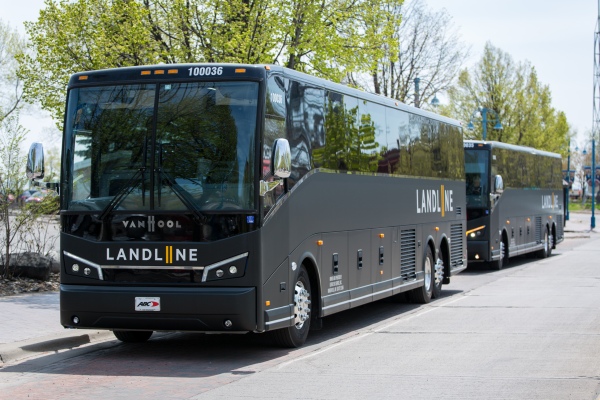[ad_1]
Share Mobility, which gives transportation options for firms, at the moment introduced that it closed a $12 million Sequence A led by Iron Gate Capital and Renewal Funds with participation from Employment Know-how Fund, JobsOhio, Seamless Capital, and others. CEO Ryan McManus stated that the aim with the brand new money will likely be threefold: supporting progress, folks, and product.
“The funding permits us to develop into our enterprise prospects’ greater than 2,000 places throughout the nation, and rent the best folks to make it occur,” McManus instructed Nob6 in an electronic mail interview. “We’re well-positioned to develop our footprint within the areas they’re asking us to develop, in addition to add extra options to our platform.”
Based in 2016, Share was initially targeted on autonomous automobiles. However it later pivoted to “mobility-as-a-service”; McManus says that the corporate discovered a product-market-fit through the pandemic.
“When folks began to return to work and corporations had been in dire want of employees, we rapidly realized that if firms are in a position to rent those that don’t personal vehicles, their hiring pool will increase from 20% to 60%. And that was the revelation — to supply a service that helps employers get workers to work, to fill these job openings, and retain them,” McManus stated. “We confirmed enterprise firms that they will clear up their workforce scarcity by offering transportation as an worker profit. Firms like Google had been already offering it as a perk for workers in main hubs, however as extra enterprise firms stake their declare into areas just like the Midwest, the necessity for dependable commuter transportation was clear.”
Picture Credit: Share Mobility
Transportation is a standard worker perk amongst tech giants (excepting those under pressure from activist investors, maybe). As of 2020, there have been an estimated 1,020 non-public commuter shuttle buses within the Bay Space — a personal transportation system price greater than $250 million. Some Silicon Valley buses travel so far as 55 miles from San Francisco to choose up employees day by day.
The dramatic enlargement of personal shuttle applications displays the pressures that the tech business has placed on main cities. In Silicon Valley particularly, excessive salaries have pushed up housing costs, forcing white- and blue-collar employees to maneuver farther away from their jobs. Absent inexpensive public transportation or shuttles, workers are pressured to pay out of pocket to get to work. This disproportionately impacts low-income employees; based on the U.S. Department of Transportation, low-income People spend 37% of their earnings on commuting — a share that’s prone to enhance with rising fuel costs.
Share develops instruments designed to assist smaller firms construct their very own shuttle-based transportation options, in a nutshell. The platform leverages an organization’s knowledge to create and schedule routes and works with native fleet operators to offer automobiles and drivers, delivering a toolkit that permits for real-time car monitoring. (No phrase on whether or not drivers can choose out of monitoring in the event that they’re involved in regards to the privateness implications.)
All of the drivers Share works with are salaried, McManus stated, and use totally different automobiles relying on an organization’s necessities. Clients get a dispatch workforce and rider hotline with stay agent help.
“The workforce scarcity is likely one of the greatest challenges going through enterprise firms at the moment. HR departments have by no means earlier than tapped into the place their workers stay to draw expertise and higher retain its present workforce,” McManus stated. “We’re enabling firms in any a part of the nation to have higher, expanded entry to expertise by way of worker knowledge that reveals instantly the place their employees are coming from.”
The mobility-as-a-service market is anticipated to develop from $182.12 billion to $210.44 billion by 2026, according to Fortune Enterprise Insights. Per McKinsey, traders have poured almost $330 billion into greater than 2,000 mobility firms since 2010.
However it isn’t all the time clean crusing. In 2020, Share misplaced 96% of its income almost in a single day because the pandemic put a halt to operations, McManus stated. Even amidst the broader slowdown in tech, nonetheless, he asserted that Share is in a spot to scale by way of its enterprise mannequin, notably as firms develop into Midwestern and Southern states. The corporate has expanded to 11 states with prospects planning so as to add Share-powered routes in over 100 places this 12 months.
Picture Credit: Share Mobility
On the horizon is expanded work with municipalities. Share can work with cities to create mobility-as-a-service applications that operate like on-demand ride-sharing, however with fleet automobiles, McManus defined. Cities can use their very own automobiles or Share companions, mixing private and non-private transit to offer transportation to enterprise parks and different locations that municipal busses received’t go.
Startups like By way of are already doing this. However McManus thinks that Share’s platform is sufficiently differentiated.
“As enterprise firms proceed to battle inflation, employee shortages, provide chain points, and different elements that instantly affect its backside line, it’s evident that the necessity for a cost-effective, scalable answer to workforce challenges are essential. Improved entry to transportation and commuter advantages might help shut these gaps,” McManus stated.
Tapping the brand new money, Columbus, Ohio-based Share plans to extend the dimensions of its workforce from 35 workers to 75 by the tip of the 12 months. Up to now, the corporate has raised $19 million in enterprise capital.
[ad_2]
Source link
